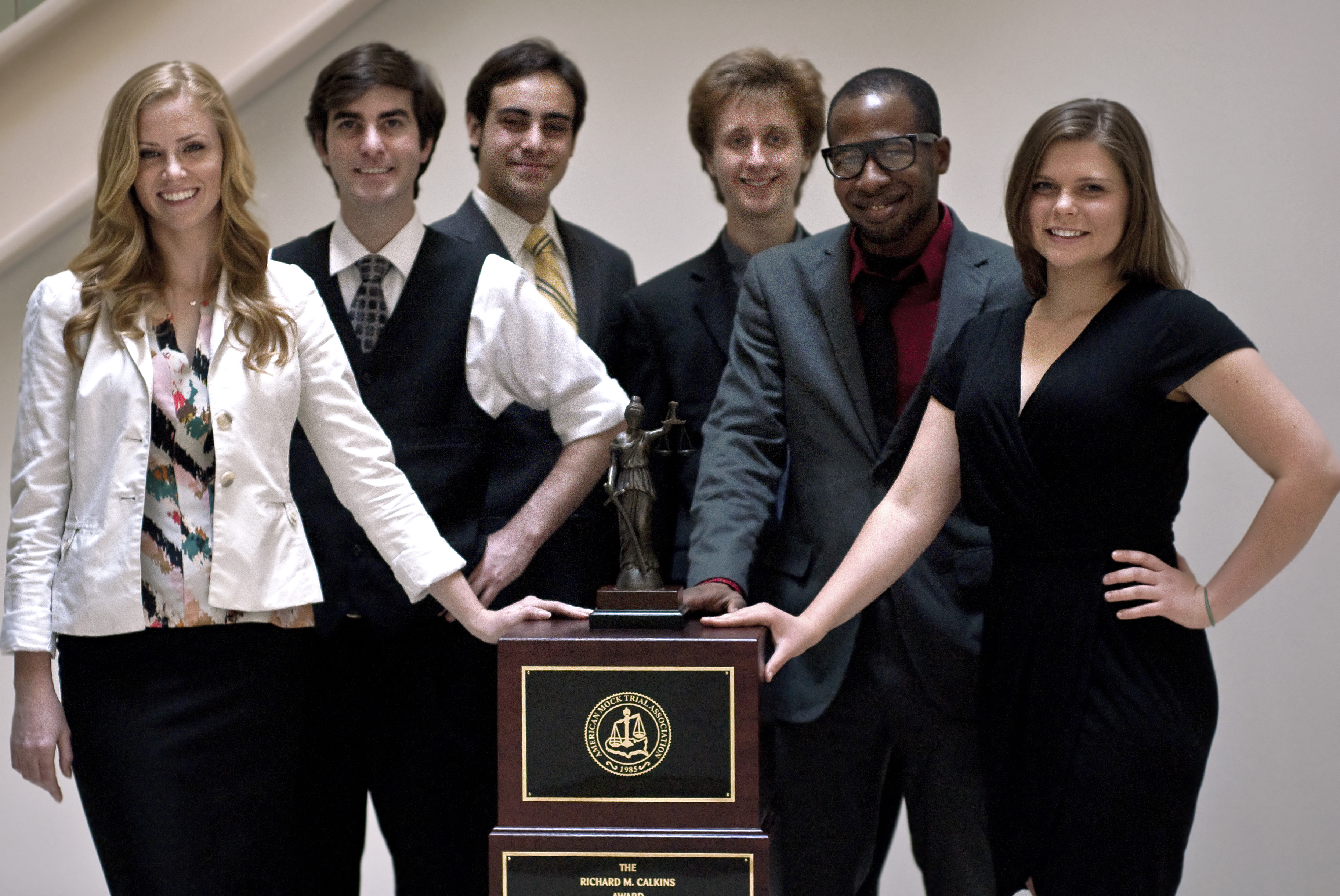UCLA Mock Trial team takes first at American Mock Trial Association 27th National Championship Tournament

From left, second-year theater student Megan Timpane, coach Nate Smith, second-year English student James Caress, first-year political science student Iain Lampert, fourth-years
American literature and culture student Brandon Hughes and English student Carol McBirney are some of the members of the UCLA Mock Trial team, which is this year’s national champions.
By Crystal Hsing
April 25, 2011 12:22 a.m.
Court case: A grieving parent sues a toy company for the wrongful death of his 2-year-old son.
For the UCLA Mock Trial team, this case may have been fiction, but the stakes were still high at the American Mock Trial Association 27th National Championship Tournament.
High stakes and cutthroat competition notwithstanding, UCLA’s eight-person team emerged victorious, beating 47 of the nation’s top teams to win the title of national champions.
UCLA previously won the championship tournament in 2004 and 2005. The most recent victory makes it the most successful collegiate mock trial team in the past decade, said Gonzalo Freixes, one of the team’s attorney coaches and a lecturer at the UCLA Anderson School of Management.
The road to becoming national champions was not easy. Tournament season began in January, and team members often spent 25 to 30 hours a week preparing for competitions. In the middle of the season, the team lost a few tough rounds, said James Caress, team co-captain and second-year English student.
“A lot of those teams that we lost badly to during the season, we ended up having to play them at the championship tournament,” Caress said. “The most valuable thing we learned was how to come back from that adversity.”
The national competition was held April 15-17 in Des Moines, Iowa. In the final round of the championship, UCLA’s team competed against last year’s national champions, New York University.
Five judges from the Iowa Supreme, Appellate, Federal and Trial Courts oversaw the championship round and judged in favor of UCLA 4-1.
“During the last round, I was like “˜Oh man, the other team is really good,'” said Jake Perkowski, team co-captain and a fourth-year English student. “But when they announced the ballots and said “˜UCLA,’ we all just screamed. It was the best feeling.”
Reaching the final round proved difficult even before the tournament began, as more than half the members missed their flight to Iowa.
Once the team managed to arrive at the tournament, they competed for six or seven hours a day, Perkowski said.
“It was just like a go, go, go weekend,” he said.
At the tournament, UCLA competed against four other universities, including the University of Virginia, whose team was the favorite to win this year. UCLA stood out because it combined technical skills with a strong, confident presentation, Freixes said.
UCLA’s success was also because of the team chemistry and the amount of time members spent preparing, Caress said.
“Throughout the season, we grew together to become a sort of family,” Caress said. “I know it’s hokey, but it was really our ability to work together as a team, to put aside any differences and focus on our goal that made the difference.”
In collegiate mock trial, a team consists of three attorneys and three witnesses. The attorneys must make an opening statement, conduct examinations of the witnesses and deliver a closing argument, while witnesses answer questions from both the prosecution and the defense based on their witness statements.
UCLA Mock Trial consists of four competitive teams. In most years, UCLA qualifies two teams into the national tournament, which allows it to send its varsity A and B teams.
This year, however, only the B team won a bid to nationals.
The organization had the option of restacking its B team to include its most experienced members. But it ultimately decided to send the team without making any changes to the roster, Freixes said.
“The fact that we sent our B team, our second varsity team, shows the depth of our program,” he said.
Though the B team had many experienced performers, two of the members, Iain Lampert, a first-year political science student, and Megan Timpane, a second-year theater student, were newcomers who had never participated in mock trial before this year.
“It’s pretty rare for first-years to do well at nationals, but both of them just did a hell of a job,” said Nate Smith, the team’s primary coach. “They did really well and were able to learn a lot over the course of the season.”
Despite the long hours spent preparing, which included studying a case packet with more than 100 pages of witness statements and case material, winning the national championship made the hard work worth it, Caress said.

